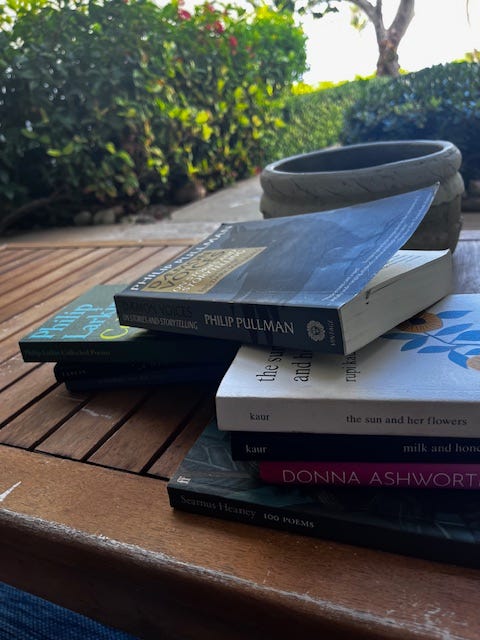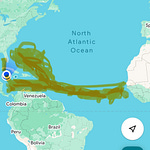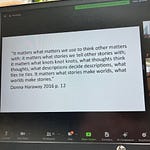“Writing about stressful situations is one of the easiest ways for people to take control of their problems and release the negative effects of stress from their bodies and their lives.” -James Pennebaker, PhD
Is it something that you’ve ever tried?
I’ve been doing far less writing for myself since moving overseas than ever before and Substack has been such an important place for me to keep showing up. Now that I’m starting to feel a little more settled in my new pad, it’s time to shift what and for whom I’m writing. So today, I’ve made the commitment that every other week I will spend the time I would usually be writing for you guys, to write just for myself. I love to read and write poetry, and I have a growing collection of poetry books on my shelf that have been neglected for a while.
I woke ridiculously early today to watch a presentation by Kate McBarron, writing for wellbeing practitioner on the evidence for this work. Provided for Lapidus members, a UK based organisation supporting writing for wellbeing, the time difference was not in my favour!
I went, hoping to have a plethora of new studies to read, and a clearer path on which to take my next steps. Some of what I discovered is what I already knew, that there is a lot of enthusiasm, books with personal experience, rich and compelling case studies, but limited large scale research. What there is shows mixed results, and some areas have more positive evidence than others e.g. palliative care and dementia. When we experience a shift in our perception of ourselves, or are coming to the end of our lives, we may look to writing to help us create a story, and understanding of ourselves, or to leave a legacy for others.
Kate is generous in sharing what she knows, both in the talk and by providing access to her database for Lapidus members, and it was worth attending. The parts I was most interested in were self development, community and mental and physical health and I have a list of useful books, articles, and reviews to seek out that I hope will resource me on the future path.
Willow Blooms began with the intention of creating space for expressive writing. Shortly after joining Substack I secured a job overseas, lifted up my life from the roots and moved across the world, to plant myself in an unknown environment. I’ve included ideas and reflections based on psychological theory and poetry, but my articles have sometimes been a filtered version of a diary of my experiences. You have been my companions whilst I have been learning about writing for well-being in practice, and figuring out how I want to show up here.
What is Willow Blooms and where will it go next?!
We all have something we can conceptualise as a mental map in our mind of the world, ourselves, and others- a bit like those novels with a map at the front, that help us visualise the world that is being described in words (I find them so helpful to flick back to!). In real life we develop our maps unconsciously, from our experiences and interpretations, and don’t realise we are doing so. We use the map to help us make sense of our experiences, and predict what might happen. We tend not to notice our mental maps until it is at odds with our environment, or others are behaving in ways that conflict with how we expect them to. It can feel so uncomfortable that we might try to change the person, the environment, or the meaning we make. Some of the themes I’ve written about recently have come about because my mental map of the world has been at odds with what I’ve experienced or read about, and writing helps me create a new story, to accommodate the new information into my map, or edit it. When you move countries you are often confronted with situations where you discover the gaps or flaws in mental maps that you were previously secure in. Trying to adapt and integrate new information can be challenging!
Kate’s talk put the fire back into my belly to continue to pursue my interest in this area. Coming from a profession that prides itself on evidence based practice, the importance of research has been drilled into me for many years. It provides the foundations of everything that is offered in the NHS, and rightly so. Money is scarce and any treatment and intervention offered by the service needs to show its credentials- effective, and safe. I have always been on the cautious side of innovation, and here I think it is well-placed. How do we make sure our therapeutic writing practice is safe?
Expressive writing workshops typically use prompts from poetry or prose, framed around a theme of a session that the person is informed of when they sign up. When we write in response to prompts, we typically have no idea what will come from within us. That’s what is so powerful about it, we circumvent many of the barriers we don’t always realise we have. Something light and joyful might emerge, or something deep rooted that has influenced us significantly but we don’t often think about. It can show us things about ourselves that we haven’t previously seen, or put known things together in a way that provides new insight and understanding or ways of moving on. For these reasons it can be transformative, in a positive way. Expressive writing can also be transformative in a challenging way, bringing things to the surface that unsettle us, that we might not be in a place to process right now. In many circumstances this is ok- we are robust enough to recognise this is too big to handle, and use our established psychological defences, or supports to put it away again. But sometimes people don’t have the resources to do this, and when working with people in distress, psychologists have a responsibility to consider what people can manage- supporting them to stay within the bounds of safe uncertainty. We need to ensure that people are able to bear what might come up, otherwise it risks being a traumatic rather than a therapeutic intervention. This is the part of the picture that I am not yet sure how to navigate. I haven’t read much research that explicitly says how practitioners explore this, and how they create safety.
If others are embarking on this work, or already well into it, these are the kinds of conversations I’d love to be part of.
In The Cayman Islands Monday is a public holiday marking Emancipation Day. My knowledge about the history of slavery on the Cayman Islands is limited, and based on the 2024 article by Stuart Wilson, Wikipedia, Cayman Islands Government website, and unknown author.
NOTE- I’ve chosen to avoid the term slave, and use the words enslaved people. I am mindful that others may have different perspectives on this, but I found one discussion about terms which shows some of my thinking about emphasising personhood, which might be of interest.
Cayman did not have plantations like many of the Caribbean islands, but was thought to have enslaved people between 1734 and 1834. Mostly people were forced into domestic slavery for people who ‘were white but not all that wealthy’.
In 1802, the population of Grand Cayman was 933, and 545 were classed as enslaved people (58%). According to the National Museum, by 1835, the number had risen to over 950, enslaved in 116 Caymanian families.
1807 the British abolished the trade in people from Africa- people could not be transported but they were still not emancipated.
1817 the British government commissioned a census of people enslaved on British Caribbean plantations- Cayman was not included in the census.
1834 the British Parliament voted to emancipate enslaved people, but people had to work 4 years as unpaid apprentices. This was also not known to the Caymanian people until 1835, and here the 4 year rule was not applied.
190 years today, May 3rd 1835, the people who had been enslaved on Grand Cayman were manumitted.
The word celebrate is used on the Cayman Island Government webpage, whilst other times ‘commemorate’ is used, acknowledging the conflicting emotions brought up by a day like this.
Enjoy your weekend- and if you have it, the extra gift of a holiday Monday.
I’ll be back in a fortnight :)













Share this post